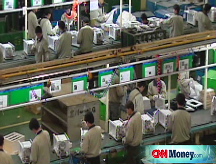China to the rescue
Global markets rallied Wednesday on hopes that China will boost its stimulus package. Could China help lead the U.S. out of its economic rut?
NEW YORK (CNNMoney.com) -- Investors have largely panned the stimulus package that President Obama signed into law last month. But stimulus in China? Now that's a different story.
Stocks around the world rallied Wednesday morning, and some attributed the pop to reports that the Chinese government was planning to boost its spending on infrastructure and manufacturing.
The Shanghai Composite Index surged more than 6% Wednesday. And shares of several Chinese-based companies that trade in the United States followed suit: the stocks of wireless telecom provider China Mobile (CHL) and oil giant CNOOC (CEO) each gained about 7% while Internet search leader Baidu (BIDU) shot up nearly 12%.
But increased stimulus from Beijing may do more than just help companies based in China. A healthy Chinese economy could go a long way toward lifting the sagging U.S. economy and others around the world as well.
"The worst thing that could happen to the global economy is if the U.S. falls and China also collapses," said Jerry Zhang, senior portfolio manager Evergreen Emerging Markets Growth fund. "People are worried about a global death spiral. China might be able to break that."
Zhang added that, given China's massive need for oil, a resurgent Chinese economy could also give a boost to energy companies around the world, many of which are now trying to adapt to a world where oil prices have plunged.
"If China can stabilize, this can help left commodity prices. Positive news from China is good for the energy sector," he said.
It also goes without saying that China is incredibly important to the United States. The Chinese government is the largest investor in U.S. Treasuries -- and we will need them to keep buying this debt in order to help fund the stimulus package and numerous financial sector bailouts.
What's more, several big U.S. companies are increasing their presence in China, particularly those that make raw materials and industrial equipment.
Keith Hembre, chief economist with First American Funds, in Minneapolis, said that an increase in resources allocated by the Chinese government to infrastructure projects should be favorable for capital goods companies.
So that may be on reason why the two biggest winners in the Dow Wednesday morning were aluminum producer Alcoa (AA, Fortune 500) and construction equipment giant Caterpillar (CAT, Fortune 500).
Other sectors could benefit too.
Yum! Brands (YUM, Fortune 500), which owns KFC, Taco Bell and Pizza Hut, is a major player in China, for example, and counted on sales there for nearly a third of operating profits in 2008.
Nike (NKE, Fortune 500) has been making a bigger swoosh in China as well. Thanks in part to buzz tied to last summer's Olympics in Beijing (Nike was a sponsor for the U.S. Olympic team), Nike's sales in China increased 40% during the first half of its most recent fiscal year.
To be sure, China is still benefiting more from its relationship with the United States than the other way around.
The trade deficit with China mushroomed 4% to a record high in 2008 and Zhang said that it will probably take a long time before Chinese consumers become voracious buyers of U.S. goods.
But Hembre said it's possible that as this downturn wears on, countries with more resilient economies, such as China and India, may become more significant importers. So if stimulus helps the Chinese consumer, that is a plus.
"Emerging market countries that grew strongly off of exports need to reorient themselves. What we need is a rebalancing of global growth. What the globe is missing right now is demand for products," Hembre said.
Still, it's worth backing up and asking why China even needs stimulus in the first place. After all, the economy still grew 6.8% in the fourth quarter.
The problem is that this growth rate was the slowest in China in seven years. And according to a survey of global chief financial officers released Wednesday morning by Duke University and CFO magazine, many Chinese CFOs have the same worries as their Western counterparts -- weak consumer demand and the credit markets.
In addition, more than two-thirds of the 258 CFOs surveyed indicated they would impose a hiring freeze this year while 30% said they would likely cut workers' wages.
So it's pretty clear that even though China may not technically be in a recession, companies there are starting to act like they are. And if that persists, that would be more bad news for an already reeling global economy.
"Worldwide stimulus is important. A lot of emerging market economies could be perking up and if so, that's promising," said Doug MacKay, president and chief investment officer of Broadleaf Partners, a money management firm in Hudson, Ohio. ![]()



